Mihir Mishra in New Delhi
The Changi Airport Group in Singapore has made it a roaring success.
The Dubai Airport sees it as a huge money spinner.
And now, Delhi International Airport Ltd, or DIAL, wants to follow in their footsteps. It wants to make Indira Gandhi International Airport the next international transit hub.
The Singapore and Dubai airports handle 140,000 and 110,000 passengers daily, respectively.
And, half of these are transit passengers.
They contribute 30 per cent to the total sales at the airports.
DIAL has seen a sixfold rise in the number of transit passengers to 6,000 in the past one year, but it's just 7.5 per cent of the 80,000 passengers handled daily and contributes only six per cent to the total sales at the airport.
. . .
How Delhi airport plans to earn more money
Image: Delhi International Airport lounge."Around 80 per cent of our transit passengers are international and the rest are domestic. "The international passengers are mainly from Bangladesh and Nepal.
"They contribute almost six per cent to the total revenue from sales at our airport," said I Prabhakar Rao, chief executive of DIAL, a GMR Infrastructure-led consortium.
The Delhi airport operator sees a silver lining in the rising transit passenger numbers amid ballooning losses.
DIAL, which spent Rs 12,700 crore (Rs 127 billion) on modernising the airport, incurred a loss of Rs 450 crore (Rs 4.5 billion) in 2009-10 and is expected to post Rs 800 crore (Rs 8 billion) in losses this financial year.
. . .
How Delhi airport plans to earn more money
Image: Delhi Airport duty free shops.It is losing Rs 2 crore (Rs 20 million) daily after a court order stopped it from charging the airport development fee till the airport regulator allowed it.
All that has led to an all-time high borrowing of Rs 600 crore (Rs 6 billion).
The DIAL management agrees it is at a disadvantage, as it does not have a strong flag carrier to give it volumes.
Air India does not have the strength to make it possible.
"That's why we are talking to a lot of international airlines to use our airport as a transit point," said Rao. DIAL is also in talks with the government to allow more private Indian carriers to start international flights.
. . .
How Delhi airport plans to earn more money
"There are various routes where Indian carriers have not been able to utilise their quota of seats, whereas their international counterparts have done so. If Indian carriers are allowed, we will get a lot of passengers and, hence, revenues."
However, the civil aviation ministry has its own compulsions. It has to keep state-owned AI's interests in mind while allowing others to fly abroad.
With Rs 20,000 crore (Rs 200 billion) in accumulated losses and Rs 42,000 crore (Rs 420 billion) in debt, AI has time and again asked the ministry not to allow any other carrier, neither domestic nor international, to fly international till it started making profits.
"All Indian carriers do not want the government to sign any more bilateral agreements, which means a virtual stop to any more international airlines from coming to India," said a senior ministry official.
. . .
How Delhi airport plans to earn more money
Image: Delhi International Airport.Analysts and airlines say DIAL needs to think out of the box to make the airport an international hub.
"We also want Delhi to be an international hub but it cannot happen if only we work towards it. The airport operator should ensure the cost of infrastructure and facilities it provides are cost-effective and we are incentivised to bring in passengers," said Suresh Nair, regional head for Air Asia, a Malaysia-based low-cost carrier.
He said the Singapore airport incentivised carriers by paying SGP $5 per increased passenger.
India is one of the fastest growing aviation markets and every airline wants to grab a share of the pie. It has witnessed a passenger growth of 20 per cent, among the largest in the world.
. . .
How Delhi airport plans to earn more money
Image: Delhi International Airport.Photographs: Rajesh Karkera/rediff.com
Six major Indian carriers with 400 aircraft catered to 143 million passengers, including 38 million international, in 2010-11. Indian carriers flew 35 per cent of the international passengers.
Since the Delhi airport does not have the advantage of a strong flag carrier, an executive of an airline body said the airport operator should "focus on increasing the passenger volume and not airport charges, which might adversely impact its growth".
The operator has reportedly sought the Airports Economic Regulatory Authority's approval to raise aeronautical charges 650 per cent.
. . .
How Delhi airport plans to earn more money
Photographs: Rajesh Karkera/rediff.com
Air Asia recently pulled out of the Hyderabad airport because of a high user development fee.
The airport is run by a GMR-led consortium.
The executive said it was the right time for Delhi airport to do what it could. "Things will only get worse in the future, when various other airports will also come up in the country," he said.
"People go to airports in Singapore and Hong Kong because they provide huge shopping arenas and have extremely friendly customs and security staff. These aspects need to improve at the Delhi airport," said Amrit Pandurangi, senior director, Deloitte Touche Tohmatsu.

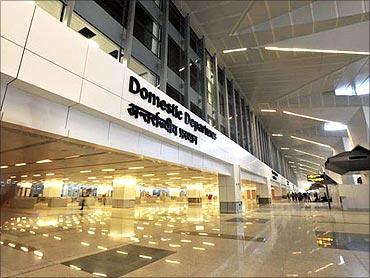
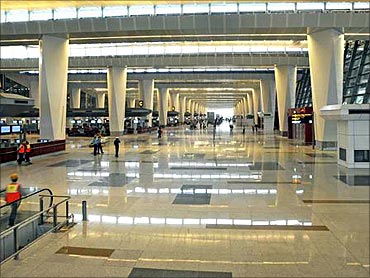

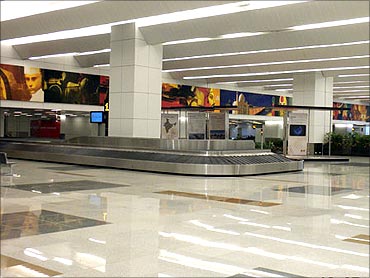
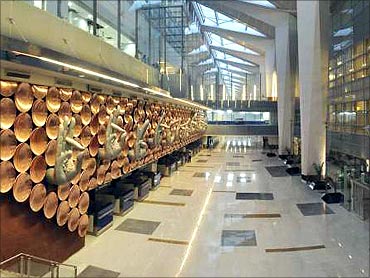
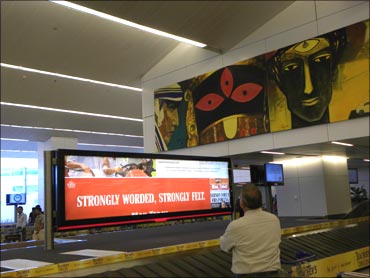
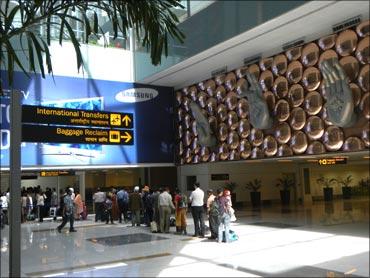

article